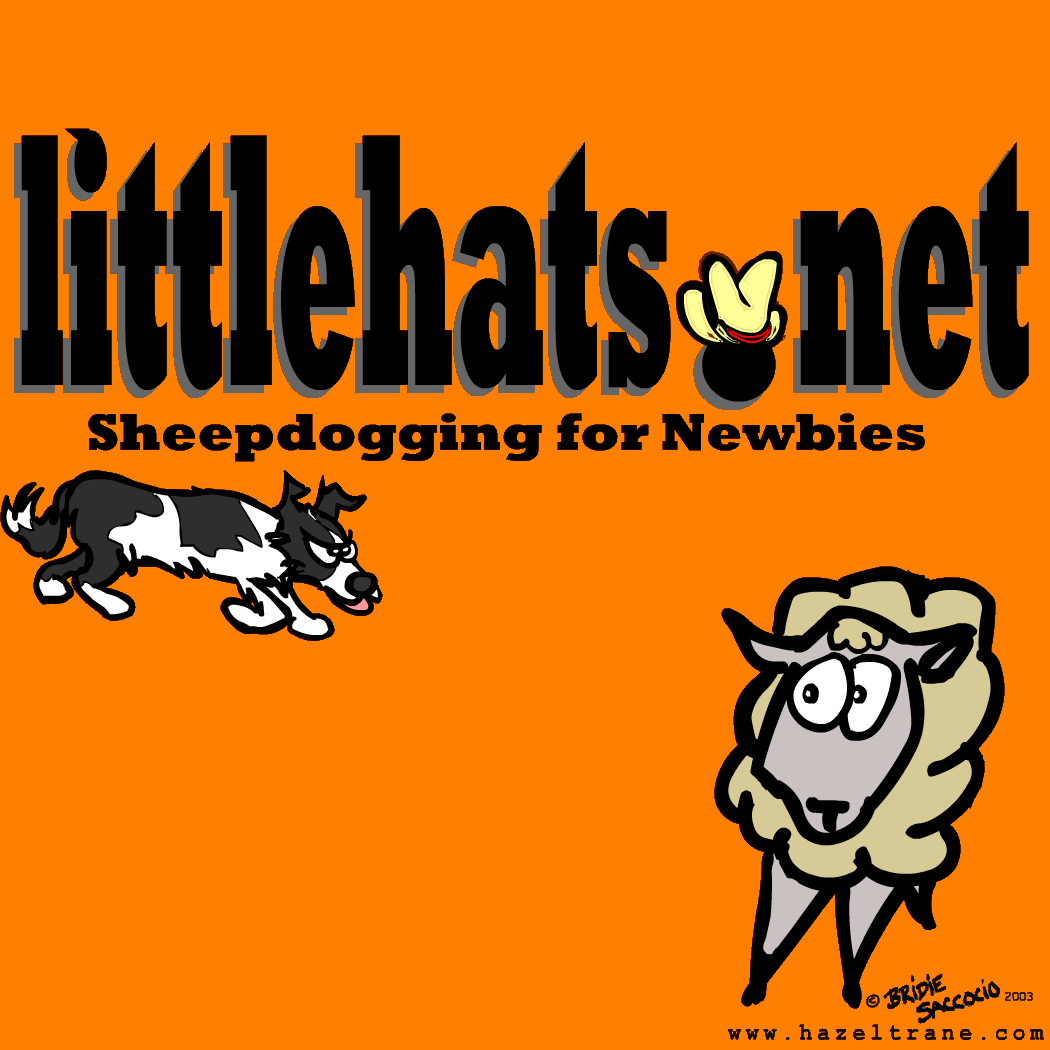


Finding An Instructor
Search This Site
Finding a good instructor can give a novice a terrific head start to becoming a good sheepdog handler. There are a lot of people who put out their shingles as instructors, but how can you know which one is right for you and your dog? Consider the following in your selection process:
Consider the Instructor's Facilities
If you don't have your own sheep, it's especially important that your instructor have adequate facilities--that field and those sheep are going to be you and your dog's only access to livestock until you take the plunge into sheepdom yourself. Your instructor should have a variety of sheep available for different training situations (heavier, dogged sheep for beginning dogs; light, undogged sheep for the more experienced) and a field with a minimum of a 150-yard outrun. A field with a bigger outrun, or the possibilities of "blind" outruns, is even better.
Consider the Instructor's Success in Trials
Success in trials certainly does not guarantee that someone will be a good instructor, nor does a mediocre record automatically disqualify someone from consideration: teaching is an art in and of itself. On the other hand, if you intend to become a successful Open handler, it's a good idea to find an accomplished Open handler to help you achieve your goals. At a minimum, a prospective instructor should be actively competing in USBCHA Open trials. Watch prospective instructors in trials and try to decide what you think of their handling styles. Do they let their dog make some decisions, only interjecting with a command every now and then? Or do they tend to command their dogs often and control their every move? Deciding what sort of handler you want to be someday will help you choose the most helpful instructor for your needs.
Talk to Some of the Instructor's Current Students
Are current students of your prospective instructor satisfied with their lessons? Would they recommend the instructor to others? Ask the students about their experiences with their dogs in detail, and pay particular attention to any problems that have come up in the course of their training. How did the instructor deal with those problems? Is the instructor willing to watch his or her students during trials and offer helpful suggestions about their runs? Does the instructor tend to be overly critical? Does the instructor shy away from offering real criticism for fear of hurting a pupil's feelings?
Watch a Lesson in Advance
Ask the instructor if you can observe someone else's lesson, to help you make your decision. Does the lesson plan seem logical to you? Does he or she communicate well with the student? Does he or she seem to have a good rapport with and understanding of the dog? Are the sheep being used well cared for and healthy? Do you think the sheep seem correct for the dog's level of experience?
Ask the Instructor What Methods He or She Uses in Training
Discuss the instructor's training philosophy, and pay particular attention he says that his method is similar to that of X trainer. If X trainer has a book or video, study it carefully to make sure that you find that method appropriate for you and your dog. If your prospective instructor wrote a book or produced a video herself, study that even more carefully!
Know Your Own Learning Style
Do you like to ask a lot of questions, or do you tend to take what someone says at face value? Do you like having your own opinion, or are you willing to let an "expert" hold the reins? It's very important that your learning style meshes with your instructor's teaching style: some love the challenge of a student who constantly asks "why," while others prefer someone who will accept an approach without comment. Talk to your prospective instructor frankly about how you expect to operate and consider his or her response carefully.
Know Your Dog
Is your dog very sensitive and eager to please, or does he tend to be a little hard-headed? Some instructors work especially well with very sensitive dogs, while others may overwhelm such dogs and are better suited to animals with a more confident temperament. It's very important that you find an instructor who helps your dog gain confidence in the task: the combination of an overbearing instructor, a sensitive, underconfident dog, and a novice handler can be disastrous. Similarly, an instructor who can't help you get a handle on a rambunctious young border collie early won't be of much help if you have a dog who needs a firm hand. Make sure you talk to both the prospective instructor and to his other students about the effect he has had on their dogs before making your decision.
Consider the Instructor's Facilities
If you don't have your own sheep, it's especially important that your instructor have adequate facilities--that field and those sheep are going to be you and your dog's only access to livestock until you take the plunge into sheepdom yourself. Your instructor should have a variety of sheep available for different training situations (heavier, dogged sheep for beginning dogs; light, undogged sheep for the more experienced) and a field with a minimum of a 150-yard outrun. A field with a bigger outrun, or the possibilities of "blind" outruns, is even better.
Consider the Instructor's Success in Trials
Success in trials certainly does not guarantee that someone will be a good instructor, nor does a mediocre record automatically disqualify someone from consideration: teaching is an art in and of itself. On the other hand, if you intend to become a successful Open handler, it's a good idea to find an accomplished Open handler to help you achieve your goals. At a minimum, a prospective instructor should be actively competing in USBCHA Open trials. Watch prospective instructors in trials and try to decide what you think of their handling styles. Do they let their dog make some decisions, only interjecting with a command every now and then? Or do they tend to command their dogs often and control their every move? Deciding what sort of handler you want to be someday will help you choose the most helpful instructor for your needs.
Talk to Some of the Instructor's Current Students
Are current students of your prospective instructor satisfied with their lessons? Would they recommend the instructor to others? Ask the students about their experiences with their dogs in detail, and pay particular attention to any problems that have come up in the course of their training. How did the instructor deal with those problems? Is the instructor willing to watch his or her students during trials and offer helpful suggestions about their runs? Does the instructor tend to be overly critical? Does the instructor shy away from offering real criticism for fear of hurting a pupil's feelings?
Watch a Lesson in Advance
Ask the instructor if you can observe someone else's lesson, to help you make your decision. Does the lesson plan seem logical to you? Does he or she communicate well with the student? Does he or she seem to have a good rapport with and understanding of the dog? Are the sheep being used well cared for and healthy? Do you think the sheep seem correct for the dog's level of experience?
Ask the Instructor What Methods He or She Uses in Training
Discuss the instructor's training philosophy, and pay particular attention he says that his method is similar to that of X trainer. If X trainer has a book or video, study it carefully to make sure that you find that method appropriate for you and your dog. If your prospective instructor wrote a book or produced a video herself, study that even more carefully!
Know Your Own Learning Style
Do you like to ask a lot of questions, or do you tend to take what someone says at face value? Do you like having your own opinion, or are you willing to let an "expert" hold the reins? It's very important that your learning style meshes with your instructor's teaching style: some love the challenge of a student who constantly asks "why," while others prefer someone who will accept an approach without comment. Talk to your prospective instructor frankly about how you expect to operate and consider his or her response carefully.
Know Your Dog
Is your dog very sensitive and eager to please, or does he tend to be a little hard-headed? Some instructors work especially well with very sensitive dogs, while others may overwhelm such dogs and are better suited to animals with a more confident temperament. It's very important that you find an instructor who helps your dog gain confidence in the task: the combination of an overbearing instructor, a sensitive, underconfident dog, and a novice handler can be disastrous. Similarly, an instructor who can't help you get a handle on a rambunctious young border collie early won't be of much help if you have a dog who needs a firm hand. Make sure you talk to both the prospective instructor and to his other students about the effect he has had on their dogs before making your decision.